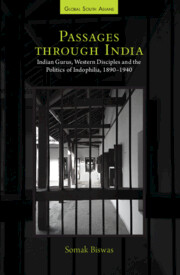Introduction: Indophilia and Its Wider Worlds, 1890–1940
Published online by Cambridge University Press: 30 June 2023
Summary
Gurus are forever.
A lock of silvery-grey hair fell off a sheaf of papers I was working on (Figure I.1). An attached note detailed its origins: the dead poet Rabindranath Tagore's beard. On his death, this was sent as a keepsake to his English disciple Leonard Elmhirst in Devon.
The hair exemplifies what I refer to in this book as deep discipleship. How did a cast of sympathetic Western subjects come to immerse and identify themselves almost completely within the aspirational communities of their Indian gurus? This book follows their lineages. Passages through India analyses the phenomenon of Western Indophilia (romanticised engagements around idealised forms of Hindu India) in late colonial British India, its ideological and affective composition, and its political implications. Rooted in disquiet with forms of industrial modernity, it looks at the nature of intimacies cultivated between major Indian guru-figures (Gandhi, Vivekananda, Tagore) and some of their Western disciples through ashrams and letters. Western disciples’ love and longing for their mentors were harnessed to service the divergent needs of an expansive Indian nationalism. Bringing together themes such as intimacy, discipleship, religion and migration, the book argues that Indophile deployments around transnational projects like abolishing indentured labour and global Hinduism, while anti-colonial, were not necessarily emancipatory. Such deployments in India, the United States, Fiji and South Africa frequently reproduced the very hierarchies of race, class, caste and gender that they sought to transgress. Unifying distinct strands of discipleship within a shared tradition of Indophilia, this volume sheds light on influential Indo-Western encounters and their profound consequences, both in India and abroad.
Framing White Indophilia
This work builds on a set of relationships between key Indian figures and their Western disciples to explore the phenomenon of Western Indophilia. The romanticised engagements of sympathetic white Westerners for idealised forms of India, usually rooted in upper-caste Hindu imaginaries, is illustrated through the influential and intersecting networks around three major figures of modern India: the Hindu monk and missionary Swami Vivekananda, the poet and educationist Rabindranath Tagore and the nationalist leader Mohandas K. Gandhi. Together their careers broadly bookend the decades 1890–1940.
- Type
- Chapter
- Information
- Passages through IndiaIndian Gurus, Western Disciples and the Politics of Indophilia, 1890–1940, pp. 3 - 24Publisher: Cambridge University PressPrint publication year: 2023



